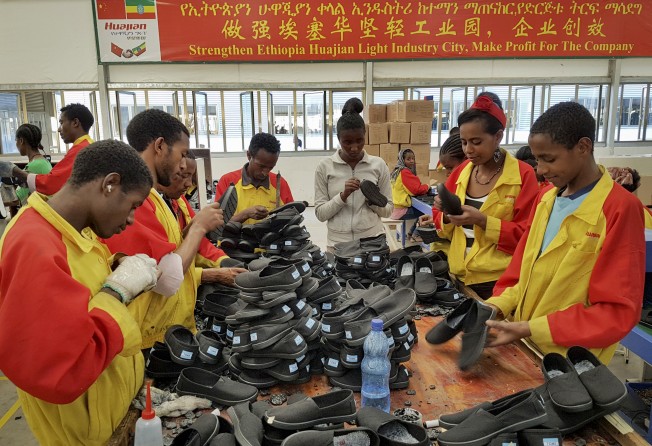The everyday reality for China’s belt and road plan in Africa is labour issues, rather than foreign relations
- When Chinese companies go to countries like Ethiopia, they find themselves having to deal with labour disputes and run up against legal and cultural complexities. These are the risks firms have to manage, away from the headlines

Chinese foreign direct investment has been pouring into Africa in the course of the “Belt and Road Initiative” introduced by President Xi Jinping in 2013. Although much of the reporting on the belt and road plan has focused on the scale of Chinese investment and foreign reactions to it, what has defined the trade strategy on the ground is labour disputes.
Ethiopia has been at the forefront of Chinese investment in Africa. The country’s low labour costs and sizeable consumer market – Africa’s second largest, with over 100 million people – make it an attractive location for Chinese companies. In 2018, there were 400 active Chinese investment projects in the country worth a collective US$4 billion.
The majority of Chinese firms operating in Africa are privately owned. Both private companies such as footwear manufacturer Huajian Group and state-owned enterprises such as the China State Construction Engineering Corporation (CSCEC) hire Ethiopians.
When there are local employees, there are also more labour disputes. Since 2017, at least a dozen strikes have been staged across a range of industries, with some involving thousands of employees. Chinese managers have had to deal with labour disputes within the company and in court, within a juridical framework that has sometimes favoured local employees over foreign employers.
The World Bank surveyed 69 Chinese businesses in Ethiopia in 2012 about various aspects of foreign investment there, including infrastructure, sales and supplies, land, finance and human resources. Sixty-five per cent of respondents disagreed that “the court system is fair, impartial and uncorrupted”, and 74 per cent disagreed that “government officials’ interpretations of the laws and regulations affecting this company are consistent and predictable”.
Today, labour disputes involving amounts under 500,000 birr (US$17,000) are heard in the Federal First Instance Court, where judges have shown a tendency to favour employees. Chinese companies have become increasingly reluctant to contest small lawsuits.
“They interrogate you and when they catch something out of line, a detail, for example, the time of signature, they immediately rule against you,” says a legal manager of CSCEC in Ethiopia. Although unfair rulings are often reversed in the high court, it can be difficult to be granted review of a case when the amount of money involved is small. The process is time-consuming and many companies simply pay up.
Besides court conflicts between labour and management, Chinese employers are also concerned about the legal statutes themselves. “Ethiopia has complicated labour laws, and newcomers are stuck in difficult situations,” says the head engineer at a CSCEC construction project in Addis Ababa. Companies have expressed unhappiness that their hands are tied by rigid regulations regarding dismissal, and that they are stuck with unsatisfactory workers they cannot fire.
As a result, companies are sometimes in legal limbo, and uncertain how to proceed. This is particularly serious for complex multi-phase construction projects. Many Ethiopian companies have voiced similar concerns as the country’s Labour Proclamation is known to favour employees.
In response, the Ethiopian government has been trying to amend the Labour Proclamation, by doubling the period of probation, capping annual leave, and allowing employers to terminate contracts if employees are routinely late. But union protests have impeded the passage of the amendment.
Meanwhile, Chinese companies are adapting to the labour environment in myriad ways. CSCEC, for example, is dividing workers into smaller groups and keeping announcement boards updated, to better manage employees and hear their grievances. But conflicts will still arise and lawsuits might still be the only option.
Risk, with regard to the Belt and Road Initiative, is often understood in security and financial terms. But the difficulties Chinese companies encounter in Africa reveal another side of the trillion-dollar project. By employing African workers, Chinese companies have become vulnerable to local red tape and cultural complexities. As Chinese companies embark on a sharp learning curve in Africa, examination of the belt and road plan should focus not only on questions of security and finance, but also on the mundane but perennial issue of employer-employee relations.
Celine Sui is a US-based independent scholar and freelance journalist focused on Sino-African relations